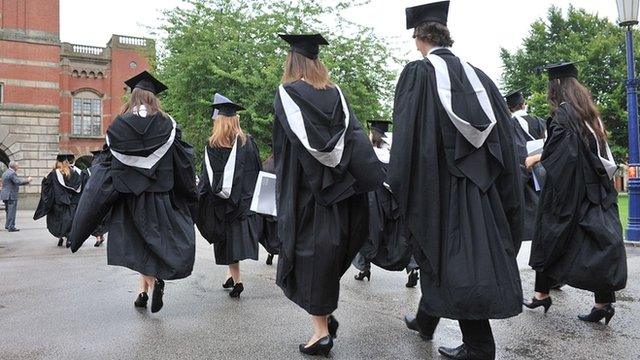University applications fall with drop in nursing and EU students
- Published
- comments

This is the first fall in applications since tuition fees were last increased in 2012
University applications have fallen by 5% - with the decline driven by a drop in European Union students and a sharp fall in nursing applications.
Fees in England are rising again, and it is the first fall in UK applications since fees were last increased in 2012.
The Royal College of Nursing blamed the 23% drop in nursing applications on the removal of bursaries.
Universities Minister Jo Johnson said that despite the overall drop, more 18-year-olds were applying to university.
These Ucas admissions figures, up to the January deadline for courses starting in the autumn, show a 5% drop in UK students and 7% drop in students from the European Union - with a total of about 564,000.
Universities have been warning about the impact of Brexit on their finances if European applications fall and these figures show a significant decline in candidates from the EU.
Competing for students
There has also been a decline in UK students applying - and like the two previous occasions when applications have fallen - this has been when fees are being increased.
The fall in applications in England of 6% has been three times greater than in Scotland at 2%, which remains without tuition fees.
Applications from Wales fell most, by 7%, and Northern Ireland by 5%.
Nursing had the biggest fall of any individual subject, and Janet Davies, general secretary of the Royal College of Nursing, blamed this on the switch from grants to fees and loans.
"We warned the government the removal of student funding would see a sharp drop in nursing applications. These figures confirm our worst fears," said Ms Davies.
She said the "nursing workforce is in crisis".
But there were drops across other subjects - particularly among older students not applying directly from school.
Among 19-year-olds, numbers were down 9%. And among 25-year-olds, applications were down 23%.
But among 18-year-olds, such as sixth-formers applying from school, numbers have continued to rise to record levels, up to 37% of the age group.
And there could be an upside for those who are seeking places - with universities likely to be competing to attract students.
'Disappointing'
Ucas chief Mary Curnock Cook said this "tough recruitment environment for universities" would mean "unprecedented choice and opportunity for applicants".
Sorana Vieru, vice-president of the National Union of Students, said the fall in applicants was "disappointing, but not a surprise".
"Uncertainty around increases in tuition fees, loss of maintenance grants and the rising costs of living and studying at university are too much of a risk to some potential students," she said.
Labour's shadow universities minister, Gordon Marsden, said: "We warned the government at Christmas their sneaked-out tuition fee increases and the accompanying increased debts would have damaging impacts on students and their numbers."
Universities Minister Jo Johnson said: "More young people than ever are choosing to go to university, with record application rates for 18-year-olds this year as well as those from disadvantaged backgrounds."
- Published22 December 2016

- Published21 July 2016
